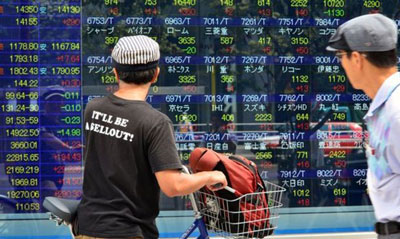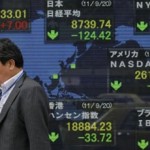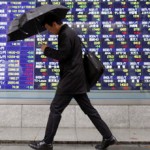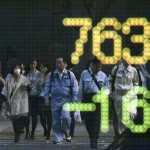Asian Stocks Rise With Oil as Pound’s Rebound Stalls; Yen Gains

-
Gold rises as industrial metals decline; oil back above $48
-
BOJ’s Kuroda says funds can be added to market as needed
The relief rally endured, with Asian stocks rising in tandem with European equity index futures and oil amid speculation policy makers will use stimulus to blunt the impact of the U.K.’s decision to leave the European Union. Haven assets including gold and the yen advanced as the pound fell.
The MSCI Asia Pacific Index gained the most in a week and has now recovered almost half of the loss seen on Friday, when the outcome of Britain’s vote on EU membership became clear. Crude oil climbed above $48 a barrel and gold rose toward a two-year high, while nickel led a retreat in industrial metals. The pound lost ground against all of its G-10 peers, having rebounded from near a 31-year low on Tuesday. Japanese bond yields sank to new records.

Investors are looking to policy makers for support as they await Britain’s plan for its extrication from the EU, something that’s being held back by political upheaval in the country following the vote and Prime Minister David Cameron’s consequent resignation. South Korea announced a fiscal stimulus package on Tuesday and Bank of Japan chief Haruhiko Kuroda said Wednesday that more funds can be injected into the market should they be needed. Futures indicate the Federal Reserve is unlikely to raise interest rates before 2018.
“While central banks assuring investors they’re ready to support the markets helps sentiment, it may be too early to turn optimistic,” said James Woods, a strategist at Rivkin Securities in Sydney. “We’ll probably continue to see heavy volatility. We’ll have to see what unfolds in the U.K. with the political situation after Brexit.”
EU leaders will gather in Brussels on Wednesday for the second day of a two-day European Council summit to discuss Britain’s withdrawal from the bloc. Data are due on euro-area consumer confidence, U.S. personal spending and Argentina’s gross domestic product.
Stocks
The MSCI Asia Pacific Index climbed 1.6 percent as of 7:06 a.m. London time, with benchmarks rallying across the region. Japanese Prime Minister Shinzo Abe said Wednesday he will mobilize all possible measures to deflect the negative effects of the so-called Brexit vote.
“The panic selling in global markets has eased,” said Chihiro Ohta, a senior strategist with SMBC Nikko Securities Inc. in Tokyo. Wednesday’s meeting between Abe and the BOJ served as a “psychological anchor” for markets, but “we have to continue to be vigilant over the EU presidential decisions and currency intervention,” he said.
Japanese refiner Idemitsu Kosan Co. tumbled as much as 10 percent in Tokyo after descendants of its founder, who together hold a 33.9 percent stake, said they areopposed to a planned merger with Showa Shell Sekiyu KK that was announced in November. Showa Shell slid about 3 percent.
Futures on the Euro Stoxx 50 Index climbed 1.2 percent, while those on the U.K.’s FTSE 100 were up 1.3 percent. Contracts on the S&P 500 Index added 0.2 percent after the U.S. benchmark jumped 1.8 percent in the last session, its best performance in almost four months.
Currencies
The pound reverted to losses, slipping 0.4 percent to $1.3297. It rebounded 0.9 percent on Tuesday following a record 11 percent plunge over the previous two sessions, when it sank as low as $1.3121. The euro declined 0.1 percent.
The yen rose 0.5 percent following a 0.7 percent decline on Tuesday. The Bloomberg Dollar Spot Index, which tracks the greenback against 10 major peers, was little changed, after retreating 0.5 percent in the last session. The New Zealand dollar — the highest-yielding G-10 currency — gained 0.4 percent.
The yuan strengthened 0.2 percent in Hong Kong’s offshore market, gaining for the first time in a week amid speculation Chinese authorities were intervening to support the exchange rate. The currency was little changed near a five-year low in Shanghai, where it has weakened 3.1 percent since the end of March, set for the biggest quarterly loss in more than two decades.
South Korea’s won surged 1 percent for the second day in a row, after the government on Tuesday announced a fiscal stimulus package of more than 20 trillion won ($17 billion). The ringgit strengthened 0.4 percent as the pickup in crude prices brightened prospects for Malaysia, Asia’s only major net oil exporter.
Turkey’s lira rose 0.1 percent, after jumping 1.2 percent in the last session. Suicide bombers killed at least 36 people at Istanbul’s main international airport late on Tuesday.
Commodities
West Texas Intermediate crude climbed 0.7 percent to $48.16 a barrel, building on last session’s 3.3 percent jump. U.S. oil inventories fell by 3.86 million barrels last week, the American Petroleum Institute was said to have reported, ahead of government data due on Wednesday.
“The primary driver of the oil market is probably Brexit-related volatility at the moment,” said Ric Spooner, a chief analyst at CMC Markets in Sydney. “I don’t think the situation in Europe will make too much difference to the rebalancing that’s underway.”
Gold rose 0.7 percent, after slipping 1 percent last session. Nickel declined 0.8 percent in London and copper was down 0.4 percent.
Bonds
The yield on 10-year U.S. Treasuries was little changed at 1.46 percent. U.S. government debt has returned 5.5 percent so far this year, poised for the biggest back-to-back quarterly advance since 2011, a Bloomberg index shows. JPMorgan Chase & Co., Standard Chartered Plc, TD Securities Ltd. and Standard Bank Group Ltd. — the four firms that have updated their Treasury forecasts since the U.K.’s referendum — all see 10-year yields rising in the coming 12 months.
“Treasury prices are too high,” said Enna Li, a debt investor in Taipei at Mirae Asset Global Investments Co., which oversees $83 billion worldwide. “I wouldn’t buy any. The U.S. economy is still fine.”
Yields on Japan’s five- and 10-year bonds sank to fresh lows of minus 0.32 percent and minus 0.24 percent, respectively, while the rate on German notes due in a decade was little changed at minus 0.11 percent.
Source: Bloomberg




























